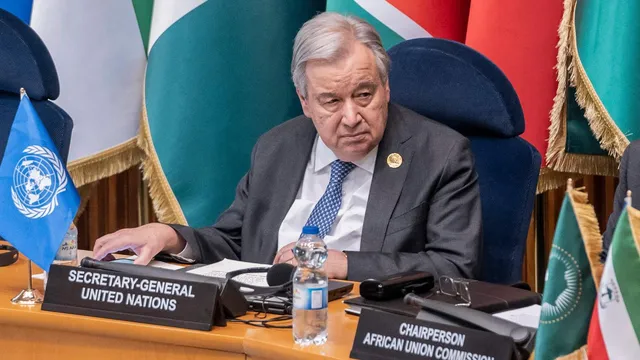
Congo faces escalating violence as M23 rebels advance into Bukavu
2025-02-17 15:57- M23 rebels have made significant advances into eastern Congo, capturing Goma and threatening Bukavu.
- Church leaders have met with the rebels to seek peace, but the government remains opposed, declaring ceasefire claims false.
- The situation has exacerbated humanitarian crises, pushing many civilians to flee and drawing international concern.
Express your sentiment!
Insights
In eastern Congo, significant violence has escalated as the M23 rebels have taken control of essential cities and territory, most notably Goma, the region's largest city. This surge is supported by approximately 4,000 Rwandan troops and represents a drastic escalation in the conflict that has already left thousands dead and many more displaced. In the latest reports, Goma has faced extensive casualties, with over 2,000 lives claimed since fighting intensified, directly impacting the lives of 6.5 million displaced individuals. Local communities now anticipate further chaos as the conflict spreads south towards Bukavu, another vital city. Church leaders, including representatives from the National Episcopal Conference of Congo (CENCO) and the Church of Christ in Congo (ECC), have approached Rwandan-backed rebels advocating for peace. Despite efforts, the Congolese government has expressed skepticism towards these peace initiatives, insisting any talks must align with previous agreements. The government has also referred to the M23's ceasefire claims as false, requesting international sanctions against both the rebels and Rwanda. The violence has incited fear among local populations, forcing many to flee their homes and seek refuge elsewhere. The United Nations reported a dire humanitarian situation, with internally displaced people lacking sufficient shelter after emergency accommodations have been destroyed. There are also indications that local civil and military forces are struggling to respond effectively, compounding the fear of potential humanitarian disaster amid the advancing rebel forces. As international discussions unfold, including the African Union's involvement, there remains a palpable tension and uncertainty about the future for both the people of Congo and the overall stability of the region, as calls for external intervention grow louder. Humanitarian agencies are warning of dire consequences if this violence is not contained soon, raising questions about the effectiveness of current efforts and the necessary steps needed to restore peace and security in eastern Congo.
Contexts
The conflict in the Democratic Republic of the Congo (DRC) has its roots in a complex interplay of historical, political, and social factors, with Rwanda's involvement serving as a significant catalyst. The aftermath of the Rwandan genocide in 1994 and the subsequent inflow of Rwandan Hutu refugees into eastern DRC created a volatile situation. Rwanda, under President Paul Kagame, intervened in the DRC conflict, initially to pursue Hutu militias responsible for the genocide. This intervention marked the beginning of Rwanda's strategic interest in the DRC, driven by both security concerns and aspirations for regional hegemony. The presence of these militias, alongside various armed groups, not only destabilized eastern DRC but also provided Rwanda with a pretext to assert its military presence in the region, citing self-defense and the need to protect its national security. The implications of Rwanda's involvement in the DRC conflict extended beyond immediate military objectives. Economically, the war facilitated the exploitation of the DRC's rich mineral resources, with Rwandan-backed groups reportedly profiting from illegal mining operations. This engagement in resource extraction exacerbated local conflicts and fueled further violence, creating a cycle of instability. The DRC’s wealth in minerals, including coltan, diamond, and gold, attracted various actors, both foreign and local, leading to a situation where economic interests often overshadowed the humanitarian plight of the Congolese people. This exploitation proved detrimental to the DRC’s sovereignty and development, raising pressing issues of governance, corruption, and human rights violations. Moreover, Rwanda's military strategies affected the dynamics of regional relationships, straining ties with neighboring countries and complicating diplomatic efforts for peace. For instance, Rwanda's support for certain rebel groups within the DRC contributed to tensions with Uganda and Angola, who also sought influence in the region. The involvement of various international actors, including the United Nations, further complicated the landscape, as peacekeeping forces struggled to address the multifaceted challenges posed by both Rwandan interventions and local insurgencies. The conflicting interests of different states and non-state actors muddled peace processes, prolonging the suffering of populations affected by the ongoing violence. In conclusion, Rwanda's involvement in the DRC conflict profoundly shaped the geopolitical landscape of Central Africa, intertwining issues of security, economic interest, and humanitarian crises. The repercussions of this intervention continue to resonate, with ongoing tensions and sporadic violence in the region. Addressing the root causes of the conflict requires a comprehensive approach that considers not only Rwanda's motivations and actions but also the broader historical context and the socio-economic conditions within the DRC. For sustainable peace and development, it is vital that stakeholders acknowledge these complexities and prioritize inclusive dialogue, regional cooperation, and the protection of human rights in their efforts to stabilize the region.